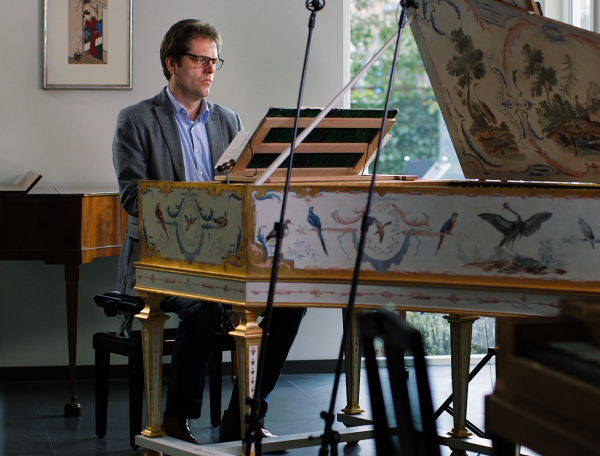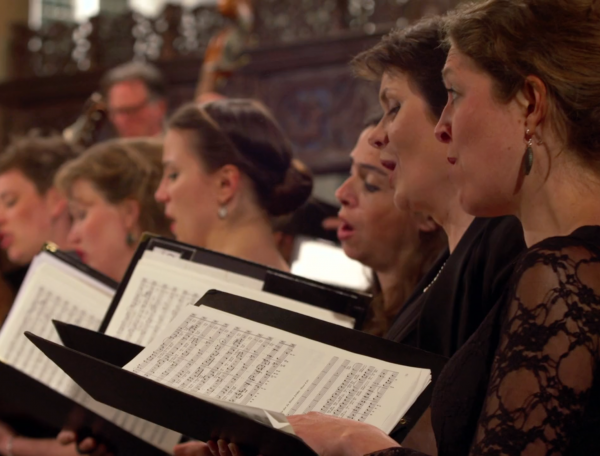

The Well-Tempered Clavier I No. 6 in D minor
BWV 851 performed by Tineke Steenbrink
at home in Utrecht, the Netherlands
Behind the music
A heated exchange of words
A serene bass and a hot-tempered upper voice argue in the prelude, ending in a fugue that is a classic example of baroque fugue technique
We enter at the climax of the debate. The bass represents the balanced opinion, stated in a serene yet self-assured tempo. But the rather breathless, hot-tempered triplets of the upper voice suggest that it has long since abandoned reason. Despite all its down-to-earth comments, the bass comes off worst - pounding out a few more individual notes and eventually giving up completely. Only then do the quarrellers embrace one another, in a glorious figured major chord.
The three-voice fugue that follows is a classic example of baroque fugue technique. It is based on a two-bar theme with a trill on the last note but one. This theme falls victim to all sorts of devices, which can easily pass the unwary listener by. For example, it is turned upside down and cut up into pieces, or else the different voices glide over one another. These sorts of techniques and many others were used by baroque composers to turn a single motif into a complete harmonious piece of architecture. This type of fugue formed the pinnacle of the art of composition, and Bach was expert at it.
Das Wohltemperirte Clavier, BWV 846-893
Composing 48 keyboard pieces in all 24 keys was the sort of challenge Bach enjoyed. In each of the two parts of the Wohltemperirte Clavier, he brought together the musical couple prelude and fugue 24 times; twelve in minor keys and twelve in major. In the preludes, he gave free rein to his imagination, and demonstrated mathematical tours de force in the fugues. In contrast to the iron discipline Bach had to apply to his church compositions, here he could abandon himself to intellectual Spielerei without worrying about deadlines.
The first part of the Wohltemperirte Clavier dates from 1722, although it contains some music that was written in the preceding five years. There is less clarity about the history of part two. Bach compiled this second manuscript only around 1740, although once again some of the preludes and fugues it contains date from a much earlier period. Bach described the target group for this collection of pieces as follows: ‘Zum Nutzen und Gebrauch der Lehr-begierigen Musicalischen Jugend, als auch dere in diesem studio schon habil seyenden besonderem ZeitVertreib’ (For both the education of the industrious musical youngster and the enjoyment of those well-versed in this material’).
- BWV
- 851
- Title
- Prelude en fugue in D minor
- Epithet
- no. 6 from The Well-Tempered Clavier I
- Instrument
- harpsichord
- Genre
- harpsichord works
- Serie
- Das Wohltemperirte Clavier I
- Year
- 1722 or earlier
- City
- Cöthen (or Weimar?)
With support from
Prins Bernhard Cultuurfonds
Extra videos
Vocal texts
Original
Translation
Credits
-
- Release date
- 6 June 2014
-
- Recording date
- 26 February 2014
-
- Location
- Utrecht
-
- Harpsichordist
- Tineke Steenbrink
-
- Harpsichord
- Lutz Werum after Johannes Ruckers, 2003
-
- Producer
- Frank van der Weij
-
- Film directors
- Jan Van den Bossche, Suédy Mauricio
-
- Camera
- Jorrit Garretsen
-
- Music recording
- Stefan Meutstege
-
- Film editors
- Dylan Glyn Jones, Suédy Mauricio
-
- Music editor
- Frank van der Weij
-
- Colorist
- Petro van Leeuwen
-
- Production assistant
- Zoë de Wilde
-
- With support from
- Prins Bernhard Cultuurfonds
Discover
Help us to complete All of Bach
There are still many recordings to be made before the whole of Bach’s oeuvre is online. And we can’t complete the task without the financial support of our patrons. Please help us to complete the musical heritage of Bach, by supporting us with a donation!

